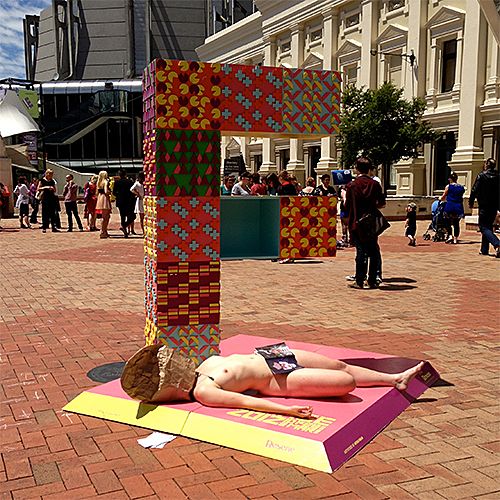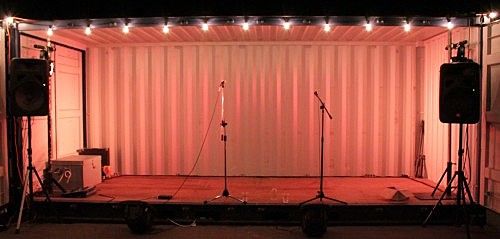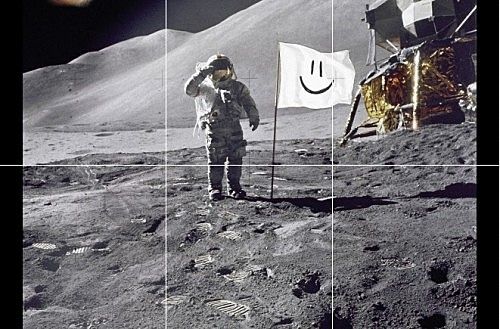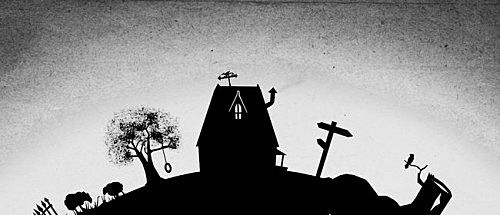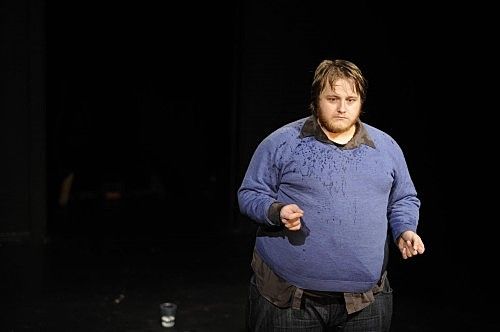A Series of Thoughts on What's Wrong With The Fringe
Uther Dean on what's wrong with the Fringe, and why he's part of the problem.
Before we start properly, I need to make one thing clear: I have written in several places and spoken a lot about how much I enjoy the Fringe. How it makes my year. How it thrills me. This is not me retracting those statements, it's me providing the other half of my thinking.
*
A list of the best shows I’ve ever seen - Binge Culture’s Drowning Bird, Plummeting Fish, Joseph Harper’s Honey, Playground Collective’s The Intricate Art of Actually Caring - is a list of the best Fringe shows I’ve ever seen. The same, however, goes for the worst shows. The wild variance in quality - the fact that you can sit in BATS and have your brain blown wide open by something truly sublime and only a drink later be enduring something so rancid it makes your toes curl through your skin and out your face - is not what is wrong with the Fringe. It's actually what is most right about the Fringe. By buying a ticket to a Fringe show, you're freeing yourself from typical qualifiers of quality. If you emerge alive at the other end, you got your money’s worth.
The Wellington Fringe Festival is exciting. It is also terrifying. In the months building up to it, it’s what I live for. When it’s happening, it’s what’s killing me. It’s an almost month of massive cultural crush - theatre and comedy and dance and busking and whatever new media thing someone is trying this year. Its variety is as oppressive as it is liberating. It’s everywhere, all of the time. It should be perfect. The streets should run red with happenings and interesting things. But no matter how hard everyone involved tries, it just doesn't.
Like most long-running events, the Fringe (now entering it’s twenty-somethingth year) can often be found guilty of holding up some platonic ideal of its past as a nirvana that needs to be returned to. Conversations about the great cooperation of previous years, of how much better the shows were, of how it just seemed more alive, seem to forget – or at least avoid - mentioning the occasional hideousnesses. No one talks about the misguided Fringe launch in Mighty Mighty where it was a million degrees, where no one could hear anything and the producer had to yell about how much they had sacrificed for the festival. Or how a few years ago, for many reasons, the Fringe was in jeopardy. For a handful of festivals in a row, each seemed to almost be the last. Funding was disappearing and it seemed like interest was waning with it. The entry fee doubled and the amount of events halved from around 100 to near 50. The Fringe was dying. People are quick to forget that a lot of the conversations that happened around that time, at least with people I knew, were not ‘How do we help save the Fringe?’ but ‘Should we? Is the Fringe, struggling along as it is, worth saving?’
[caption id="attachment_5661" align="alignnone" width="500"] This year’s Wellington Fringe branding is all about how we are now to “Worship the Fringe.”[/caption]
It’s of massive credit to the current festival staff that the Fringe didn't die. Last year was a year of rejuvenation that seems to have continued through. There are programmes once again - a physical copy of the Fringe festival programme is the definition of the thing you do not miss until it is gone - and they've been distributed to places where you can actually find them. Event registration is back up to around 100 despite the still-high entry fee. It feels like a new renaissance is around the corner. I hope it comes.
I fear it won’t.
While the Fringe can heal itself, and has done so remarkably well, it has no control over the culture that exists around it. It's that culture that is wrong with the Fringe. We are the problem. Or, more specifically, I am.
Being such a mammoth event, it's hard to pin down what the Fringe should be. What it should aspire to. The greatest clue is its name. It should be work on the edge of the arts, the stuff that wouldn't get a season or a space or even an audience at any other time of year. Some friends have just returned from overseas and are full of stories of the left of centre work they took in at the Edinburgh Fringe and festivals elsewhere. They talk in hushed, almost horrified tones of the monologue that climaxed with a man pissing into a bucket and mopping the stage with it. The audience, they report, recoiled, because the stage was on a rake and they could see the piss seeping towards them. That is a Fringe show. Which is to say that it is a show on the fringe.
Disgusting and somewhat hollow in its shocking content, it may seem at least it was doing something you wouldn't see anywhere else. When was the last time you heard of a similar show in the Wellington Fringe? Or the Auckland or Dunedin ones? I kept a placeholder line of XXXs here so I could come back and insert the most outre show I could think of from Fringes past but I’ve got nothing. Maybe it’s not that bad, maybe I’m forgetting a really obvious example but the very fact that a handful of piss-bucket shows (to coin a phrase) don’t jump immediately to mind should speak for itself. We are playing our Fringes too safely. That is not the festivals’ fault. It is the fault of the people putting work into them: when we adventure it’s rarely that far.
Established companies will use the Fringe as a testing ground or launching pad for works that could be put on any other time of year, often ‘Fringing’ the work to assuage consciences: maybe it’ll be in a found space, maybe it’ll have some arcanic technological twist, maybe it’ll be just a bit too long, but it won’t really be Fringe. I know this because I do it - A Play About Space by Uther Dean opens at BATS on the 16th of Feb and at the Globe in mid-March: book now to avoid disappointment. The Fringe becomes another deadline on the calendar to work to. Another place to show off, to be seen. To hope against hope that Hilary from Downstage will come and like it enough to maybe give you a return season. The Fringe should not be a market. It should not be a competition. So, of course, as with all things, to find its true purpose it must flirt with what it’s not. People need to remember the contract that the Fringe makes with its audience: that they are going to free themselves of traditional assumptions around what art is, how it works, what it contains, and how we judge “quality”.
We need to imbibe left of centre work, piss-bucket shows, because that is where the truly amazing can happen. Risks drive the shows to extremes. They are amazing. They are terrible. As an audience member, seeing something and not knowing whether what you’re about to see will speak to you on the most profound level and change you forever, or make you want to never trust the arts again is so thrilling. When they are great they are Great and you have to tell all your friends. When they are terrible they are Terrible and you can’t tell your friends because they were probably in it.
We need work from the fringes in the Fringes because it is the best way for all work to improve. The Fringe needs to exist because we need a Petri dish. We need a space to see what works and what doesn't; a space that celebrates and encourages experimentation because the results of those experiments spread. All good ideas of how to do things, all new things to say and new ways to say them need somewhere they can be nurtured. That is what the Fringe is for.
The overwhelming grip of capitalistic thinking on the creative sector means that new and experimental ways of working are doomed to having to seek non-traditional methods of funding. Such funding is both extremely hard to find and inconsistent when you do, making these models almost impossible to build or pass on. But the Fringe is a form of support. We all reap the benefits when new things work and when they don’t, it’s only cost us $15 so there’s nothing to complain about. This is what we need the Fringe for. This is not how we are currently using it.
This is not to say that everyone is doing the Fringe wrong. Far from it. A worthwhile chunk of the schedule is made up of premiere works coming from newly minted companies trying the arts out. These people are, for a large majority, doing the Fringe right. They’re making things because not making things is not an option. They’re saying what they have to say else they’ll crumble. The Fringe should be dangerous, but it should also be safe. That people make it the place they make their start - their first tentative toe-dip into the murky lake of making things - stands as a tribute to how supportive an environment the Fringe has made itself, especially over the past few years.
On the other hand, it’s easy to see the big wave of new-ness as an unequivocally good thing, and by and large it is. It is, however, worth noting the increasing prevalence of a rather concerning trend, especially in early or debut seasons from companies or artists. I’m not just talking about how almost all of their publicity material involves photos of hipsters staring quixotically down the lens. I’m talking about the fact that they’re not about anything. There’s a growing trend of shows about nothing or, even worse, shows about putting on shows. People are bringing work to the fringe just to have put on something. Like it’s an obligation. People are forgetting that the first step of making work is having something to say, rather than an opening night date you need to hit. The Fringe makes it easy to put on a show... I keep wanting to end that sentence with ‘almost too easy’ but that’s not right (and really prickish). People need to start seeing past the Fringe as a mechanism for getting work on and up and seen, and start seeing it as the time of year where people are more open to new ideas. I wish so hard that I actually knew how to do that. How we can all make that leap. But I just don’t. Which is really annoying, honestly. There is nothing worse than a problem with no apparent resolution.
This input of work shaped only like itself - made for its own sake, because it can - is redefining the Fringe in an almost ugly new way. You are what you eat, and the more we feed the Fringe the shows that aren’t pushing any boundaries, the less of a Fringe it will be. The Fringe should electrify the public, as well as the artists putting stuff on, and these days it doesn’t. The Fringe is on its way to becoming a boutique business – the people who make the stuff are the only people who buy it. This is because people can see the Fringe shifting. Its transformation into just another opportunity to chuck something on is showing on its skin, and that idea is transmitting to the public. The Fringe should be anything but just another cluster of people doing stuff. It should be when the walls of the artwork explode. People want to see experimentation. We crave danger. So we should give it to them. The longer we give the public anythings rather than somethings the less interested they’ll get and the greyer the Fringe will become.
[caption id="attachment_5658" align="alignnone" width="500"] The highlights of this year’s hipsters staring down the camera publicity shots.[/caption]
If there’s one thing the Fringe itself is doing wrong, it’s holding an awards ceremony. The Fringe Awards are due much more infamy than it currently has. As it stands, it’s a boozy after-party for the festival that is mostly ego and filled out by id. Awards are given out, drinks are drunk, occasionally fights almost break out. It’s not the idea of an after-match function I’m against. It’s the award element that needs to go. They add nothing to the Fringe, other than an oddly unwelcome element of competition to what should be a period of cooperation. The Fringe should be about everyone coming together. It should be one big group hug. Putting on an event at the end of it that divides the stuff of the festival into successful and otherwise works directly against that.
As someone who has sat on the judging panel for the awards, I think they’re redundant because they will never contain the broad church of events on offer. Too many genres and styles in not enough space makes any attempt at comparison impossible, ending up with faddish shows winning because “everyone liked them” not because they were the best (as if there is such a thing as ‘best’ when you’re comparing a hundred vastly distinct works). As someone who has never even been nominated for an award I think they’re redundant because they break my heart every year. And the Fringe shouldn’t break hearts. The only people who say that the Fringe awards don’t matter are the ones who’ve won them. There should not be a ‘Best of Theatre’ or ‘Best of Dance’ or ‘Best of Fringe’ because there should be no Best in the Fringe. There should just be the Fringe. It should be good enough to have just put on a show. To be still standing at the end of it should get you an award.
There is a good opportunity in the Fringe Awards for them to hook into the same kind of mad fun as the rest of the festival. They shouldn’t aspire to be the Chapman Tripps writ small as they do now. They should be the Chapman Kips writ large. They should be silly. Best Hat. Best Use of A Kitten in a Show. Things like that. Best Dead Baby in a middle-class white person play. They could celebrate the diversity of the Fringe, not pretend that it can be put into such narrowly defined categories as theatre, music, or visual arts.
I’m doing a show in the Fringe this year. Of course I am. It’s how I roll. It’s how I live. If I’m not desperately scribbling script pages in painful January 4ams then I don’t know how else I’d start my year. I may even have mentioned it already. This year, we were going to be different. We were going to do all three Fringes. We were going to make a big splash across the country. There is a reason we are in the Auckland Fringe programme but not in the actual Fringe. That reason being that we were idiots. We forgot the greatest problem with the culture around the Fringe: that it forces you into hobbyism. Every year at the Wellington Fringe launch, some holder of public office gets up and thanks everyone, declares the Fringe officially open and does the stats. They like listing the stats. X many shows, X times 10 volunteers. We then get the poetics around how great it is that so many people are giving up their time to make the town the creative capital it so manically and desperately wants to be. Now, don’t get me wrong. I am all for volunteering my time. I work in the theatre. I like to pretend I’m a writer sometimes. I know the deal. What I’m not happy to do is pay to make art. If people want to, that’s fine. Good for them. But I refuse to be turned into a hobbyist by the overwhelming circumstance of the Fringe.
Registration for all three Fringes is in that delightful September sweet-spot at the end of the year that falls just before all the funding announcements are made. You sign up well before you know if you actually have the money to make the show you’re registering. Of course: we got no funding. Making a show for nothing in the city you live in is totally doable, almost de rigueur. Taking that show to another city is not. Not without substantial personal cost. If there is one thing I believe in, if I had a motto, it would be ‘Don’t put your own money into a show.’ I have seen too many friendships end, too many major blowouts, too much hurt caused by the insertion of personal funds into work. It should not cost to make art. You don’t have to be paid, but you shouldn’t have to pay.
Yes, we should just not go. That’s why we’re not going. But the problem is around how taboo that choice felt. The decision to cancel our Auckland Fringe season is the hardest decision our company has had to make. There was such a general funk in the air of ‘just bite the bullet and do it anyway.’ Pledge Me was suggested, a lot, by lots of well-intentioned people, as if that was anything other than an already ridiculously overtapped resource, as if the constant Facebook pleadings for more pledgings are anything more than an annoyance. We couldn’t go, but every breath of the air around the Fringe, its whole aura, insisted that we do it anyway. That we make it a hobby for that moment. That hurt. That is part of what’s wrong with the Fringe.
But doesn’t the definition of Fringe, or at the very least, the one I’m operating under, preclude it from being funded? Shouldn’t the Fringe have to be for love? Surely if it’s outré enough no one should give it money and that should be a mark of pride? In theory, yes. In practice, no. There’s a whole feature to be written on the issues around the funding of the creative arts in this fair land, but, in short, there’s no ladder. There are few ways to break out of the opening Fringe/BATS/Basement step of working for little or nothing. We are good at building incubators for talent, we are bad at putting doors in them. Fringe works need to be funded, should be funded and have been funded in the past because they need to grow. They need to flap their wings and leave the nest. That’s what we were trying to do. We wanted to make space for the next lot, the next crowd of kids who were going to keep the Fringe fresh, but when all we can rely on is the wonderful and welcome small funds the Fringe offers, we can’t. They barely stretch to the costs of getting a show up – posters, Phantom, props. I know I sound like an entitled little prick, but there needs to be a way up. A way out. The Fringe’s penchant for hobbyism is doing the opposite. Forcing us down.
But let’s be clear. That’s not what’s most wrong thing with the Fringe. I am. People like me. We’re what’s wrong with the Fringe. Churning out another show, because it’s there. The fringe, that is. To fill the time. To get something up. To find another reason to whine about not winning awards. To find another way to make a show without saying something. To still pretend I’m not a hobbyist. It’s not like my work will be bad. It just won’t be Fringe. And that’s what’s wrong. The Fringe lets us do anything, so of course we do nothing. Wellington’s Fringe will be more alive than just existing when we give it work that is electric and alive and new and Fringe, not the deadly work we keep feeding it.

